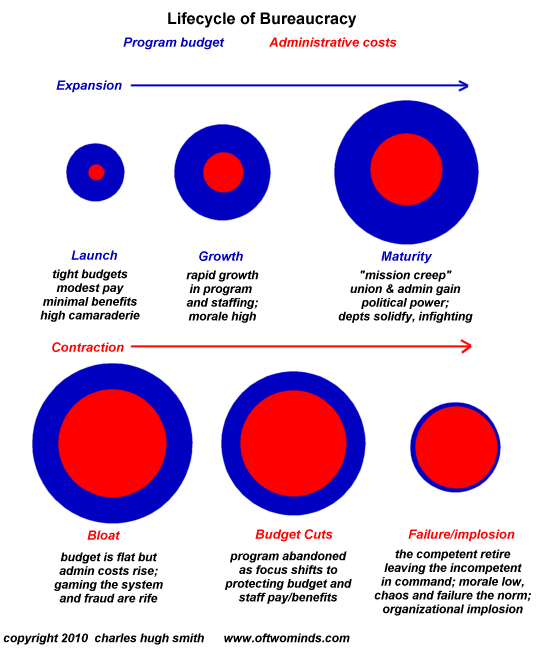
We are in impact so busy arranging the beach umbrellas per our guidelines that we do not notice the approaching tsunami.
Economic experts concentrate on what can be easily determined: sales, profits, costs, tax revenues, etc. Because the decay and failure of institutions isn’t easily quantified, this decay does not sign up in the realm of economics. Given that it isn’t determined, it doesn’t exist.
However institutional decay and failure is all too genuine, and it asks the concern: how can a society and economy prosper if its core institutions stop working? The short answer is they can not prosper, as organizations are the structures of the social and financial orders.
As I describe in my brand-new book, International Crisis, National Renewal, the standard view has an ignorant faith that “terrific leaders” can reverse institutional rot. This faith ignores the systemic sources of institutional decay and failure which are outlined in the graphic listed below, The Lifecycle of Bureaucracy, a.k.a. institutions.
Leaders are constrained by the nature of centralized organizations and the incentive structure that slowly shifts from satisfying efforts to advance the organization’s core objective to self-service and securing an ossified, failing organization from outdoors scrutiny and reform.
As Samo Burja explains in his insightful essay, Why Civilizations Collapse, those within organizations are by design so separated that few (if any) even acknowledge the organization is stopping working. As long as everything is glued together in each little compartment, no one grasps the entire organization has lost its method. And given that nobody recognizes it, nobody attempts to save it.
Institutions end up advancing caretaker supervisors who excel at the political game of increasing to the top of a vast organization. When the decay (or budget cuts) lastly activate a crisis, the institution has actually been stripped of visionaries with a vibrant grasp of what’s required to bring back the focus on the core objective and institute new rewards. The vibrant leaders quit in disgust or were sent to governmental Siberia as prospective hazards to the status quo.
The problem is institutions stop working by the very nature of their centralized design. The organization is centralized so instructions flow down the pecking order, and every branch is separated to restrict the power of each department and worker to disrupt the organized flow of top-down instructions.
Within this separated, top-down structure, the rewards are to follow procedures rather than get results. The benefits go to those who dutifully follow procedures rather than to those who raise the alarm about the loss of openness, efficiency and concentrate on fulfilling the mission.
The path of least resistance is to safeguard the existing structure and include more compartments, i.e. “objective creep.” Instead of concentrate on the dissipation of resources and the decrease of the core mission, leaders include “feel great” missions and PR promos of counterfeit reforms and initiatives that bleed more resources from the core mission.
Think about the institution of democracy, which has actually been corrupted into an invitation-only auction of state favors and rentier skims. Democracies have another deadly flaw: politicians win re-election by promising essentially everybody free ride: more advantages and entitlements and lower taxes. The gap between greater costs and decreasing revenues will be filled by government loaning.
All this additional borrowing will supposedly be paid by the magic of “growth”, which will broaden tax earnings at a rate that exceeds the cost of loaning.
However demographics, resource depletion and the lessening returns of a customer economy fueled by rapidly expanding public and personal financial obligation have sapped “growth” in fundamental methods. Ironically, borrowing and spending more to stimulate “growth” only accelerates the lessening returns of increasing financial obligation to money consumption today.
Democracies are thus enhanced for fast “development” and are ill-suited to shift to DeGrowth, i.e. less of everything for the huge bulk of the citizenry as resources become scarce and financial obligation consumes the economy alive. (DeGrowth could work to everyone’s benefit, which is the point of Global Crisis, National Renewal.)
Central banking is another stopping working institution. When confronted with financial crises, central states/banks undoubtedly succumb to the temptation to print/borrow currency in whatever sums are required to fill the shortfall of the minute, i.e. political efficiency. This profligate development of currency seems to be magic in the beginning; everybody accepts the “new money” at the current value. However eventually gravity takes hold and the currency’s acquiring power declines, as the genuine economy (the production of goods and services) grows at rates far listed below the growth of credit and currency.
Even the greatest empires in human history have been not able to resist the “simple” solution of cheapening currency as the means of fulfilling all the guarantees that were made in more flourishing times.
The development of centralized power slowly but certainly replaces the self-organizing, resistant, decentralized structures of civil society with securely bound hierarchical central structures that are significantly ineffective, increasingly expensive and significantly vulnerable, i.e. progressively vulnerable to failure or collapse.
The paradox of institutional decay and failure is everybody within is so busy following procedures that nobody notifications the decay up until the whole worm-eaten structure collapses. Look no farther than financialized asset bubbles, health care and education for instances of institutions in run-to-failure decline.
We are in result so busy arranging the beach umbrellas per our guidelines that we do not notice the approaching tsunami. Can a country prosper as its institutions decay and collapse? Just in the fantasies and wonderful thinking of the delusional.


My new book is now readily available at a 20 % discount this month: Global Crisis, National Renewal: A(Revolutionary)Grand Technique for the United States(Kindle$8.95, print$20)If you found worth in this material, please join me in looking for services by ending up being a$1/month patron of my work through patreon.com. Recent Videos/Podcasts: Charles Hugh Smith on Why Many are Resigning From Their Jobs (35 minutes, with Richard
Bonugli )My current books: International Crisis, National Renewal: A(Revolutionary)Grand Technique for the United States (Kindle$9.95, print$25)ReadChapter One totally free(PDF ). A Hacker’s Teleology
: Sharing the Wealth of Our Diminishing World(Kindle $8.95, print $20, audiobook$17.46)Read the first area
free of charge(PDF). Will You
Be Richer or Poorer?: Profit, Power, and AI in a Distressed World (Kindle $5, print $10, audiobook)Read the first section totally free
(PDF). Pathfinding our Destiny: Preventing the Last Fall of Our Democratic Republic ($ 5 Kindle,$10 print,(audiobook): Read the first area free of charge(PDF). The Adventures of the Consulting Thinker: The Disappearance of Drake$1.29 Kindle,$8.95 print); read the first chapters free of charge(PDF)Money and Work Unchained$6.95 Kindle, $15 print )Read the first area free of charge End up being a$1/month client of my work through patreon.com. KEEP IN MIND: Contributions/subscriptions are acknowledged in the order got. Your name and email stay private and will not be offered to any other private, company or agency. Thank you, Jamie D.($5/month), for your marvelously generous promise to this website– I am greatly honored by your assistance and readership. Thank you, Stephen C.( $5/month ), for your superbly generous promise to this site– I am considerably honored by your support and readership. Thank you, David T.($10), for your most generous contribution to this website– I am significantly honored by your support and readership. Thank you, Michael L.($3), for your much-appreciated generous contribution to this website– I am greatly honored by your support and readership.

